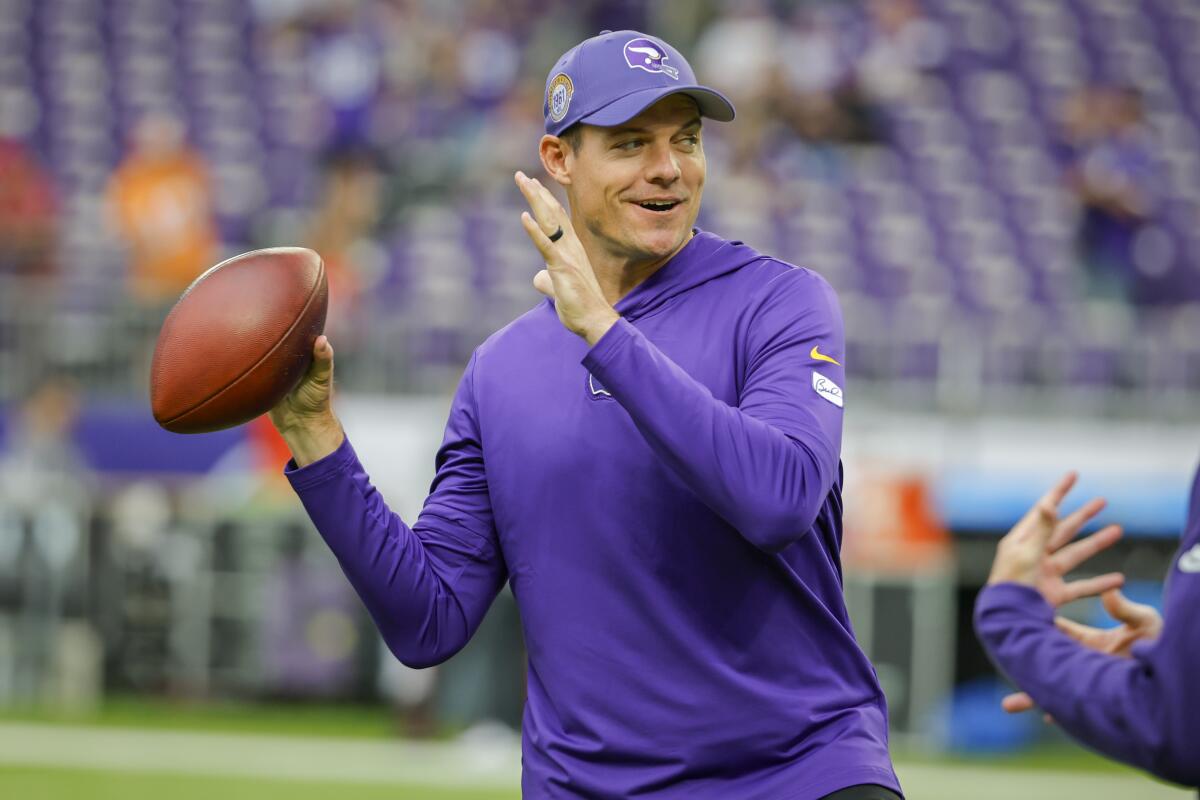Vikings offensive coordinator arrested for DWI
MINNEAPOLIS, Minn. (KTTC) – The Minnesota Vikings offensive coordinator was arrested for a misdemeanor DWI in Hennepin County Friday night.

Wes Phillips was arrested Friday and released early Saturday morning after he made bond and will travel with the team as it prepares to take on the Las Vegas Raiders on Sunday, the team said.
The Vikings released the following statement:
“Wes immediately notified the team following his arrest last night. This morning we contacted the NFL, and after internal discussion, made the decision Wes will travel with the team to Las Vegas this afternoon. We will continue to gather information regarding the incident and have further comment at the appropriate time.
The Vikings said they will continue to gather information and have further comments on the incident in the future.
Phillips joined the team as a member of head coach Kevin O’Connell’s staff in 2022.
READ MORE
Kevin O’Connell acknowledges need for more late-game aggressiveness

A recurring issue for the Vikings over the past month or so has been an inability to put teams away when they have a late lead. After famously going 11-0 in one-score games last season, Minnesota has played 11 one-score contests in 12 opportunities this year, losing six of them. One aspect of the problem that has been apparent is Kevin O’Connell’s tendency to get conservative with his play-calling late in games. It’s easy to second-guess when it doesn’t work, of course, but it has felt like O’Connell often plays not to lose — or puts too much on the shoulders of his defense — instead of going for the knockout blow. It mostly went unnoticed when it happened a couple times during the Vikings’ five-game winning streak. Up 22-17 against the 49ers just before the two-minute warning, O’Connell called three straight runs and settled for a 50-yard field goal that Greg Joseph missed — but Camryn Bynum saved the day with his second interception of the quarter. A few weeks later, the Vikings nearly blew a 24-3 halftime lead against the Saints. Up 27-19 with around six minutes left, O’Connell
dialed up eight runs within his final nine offensive plays as the Vikings went three and out three times in a row. Fortunately, Jameis Winston threw two late picks as Minnesota survived.

“I’ve gotta try to find that balance where — I do believe in our guys and I do believe that I can stay aggressive for four quarters with our guys,” O’Connell said after that Saints game. “And I’ll continue to work through that to make sure I’m giving them some premium (opportunities). We had some chances there that maybe we didn’t make the play. But there were certainly a few that I’d like to have back, knowing the situational management and milking the clock is one thing, but staying aggressive is something we’ve got to do, as well.” Those words proved to mostly be empty promises, as O’Connell did the same thing in each of the next two games. And this time, the Vikings played with fire and got burned in losses to the Broncos and Bears. In Denver, the Vikings led 17-15 and had and first and 10 from the Broncos’ 12 with around five minutes left. They went run for no gain, run for no gain, then couldn’t convert on third down and had to settle for a short field goal. The Broncos scored the game-winning touchdown on the ensuing possession, getting into the end zone against the Vikings’ defense for the first time all night.
A week later, in the disastrous loss against the Bears, the Vikings had turned the ball over four times and somehow still had a chance to put the game away late. After an Anthony Barr fumble recovery, they were up 10-9 and had first and ten from the Chicago 43 with 3:28 to play. Two Alexander Mattison runs and a screen pass later, they were punting it away. The Bears then came up with their biggest offensive play of the entire game, a 36-yard pass from Justin Fields to D.J. Moore that set up the game-winning field goal. Again, it’s easy to criticize those decisions in hindsight. From O’Connell’s perspective, you can understand wanting to make teams use their timeouts and beat the Vikings’ defense, which has been playing at a very high level over the last two months. It’s also true that the Vikings were running the ball well against the Broncos and had thrown four picks against the Bears, which may have informed the play-calling in those situations. With all of that said, something has to change. The Vikings can’t keep playing conservatively like this and asking their defense to save the day time and time again. That’s not what good teams do. Good teams go for the knockout blow. They play to win, and they play to win by multiple scores. O’Connell acknowledged that dynamic in a recent sit-down with Paul Allen.

“As a team, what can we do better to close (games)?” he said. “How can we be as coaches? Can we be more aggressive, can we be smarter with how we’re handling the end-of-game situations?” “You’re making decisions as an offense to limit risk, knowing maybe you’re not completely at full capacity as far as your personnel goes,” O’Connell said. “But I do believe in the end, where we’re going to get to as a football team this year, we’re going to have to find ways to win football games, finish football games. If that takes being a little bit more aggressive and bucking the traditional trends of the clock and field position and all those things, so be it. We’re going to do what we feel is best, each and every opportunity we have left. That’s our job as coaches, and we’ll continue to improve on that.”

Leave a Reply